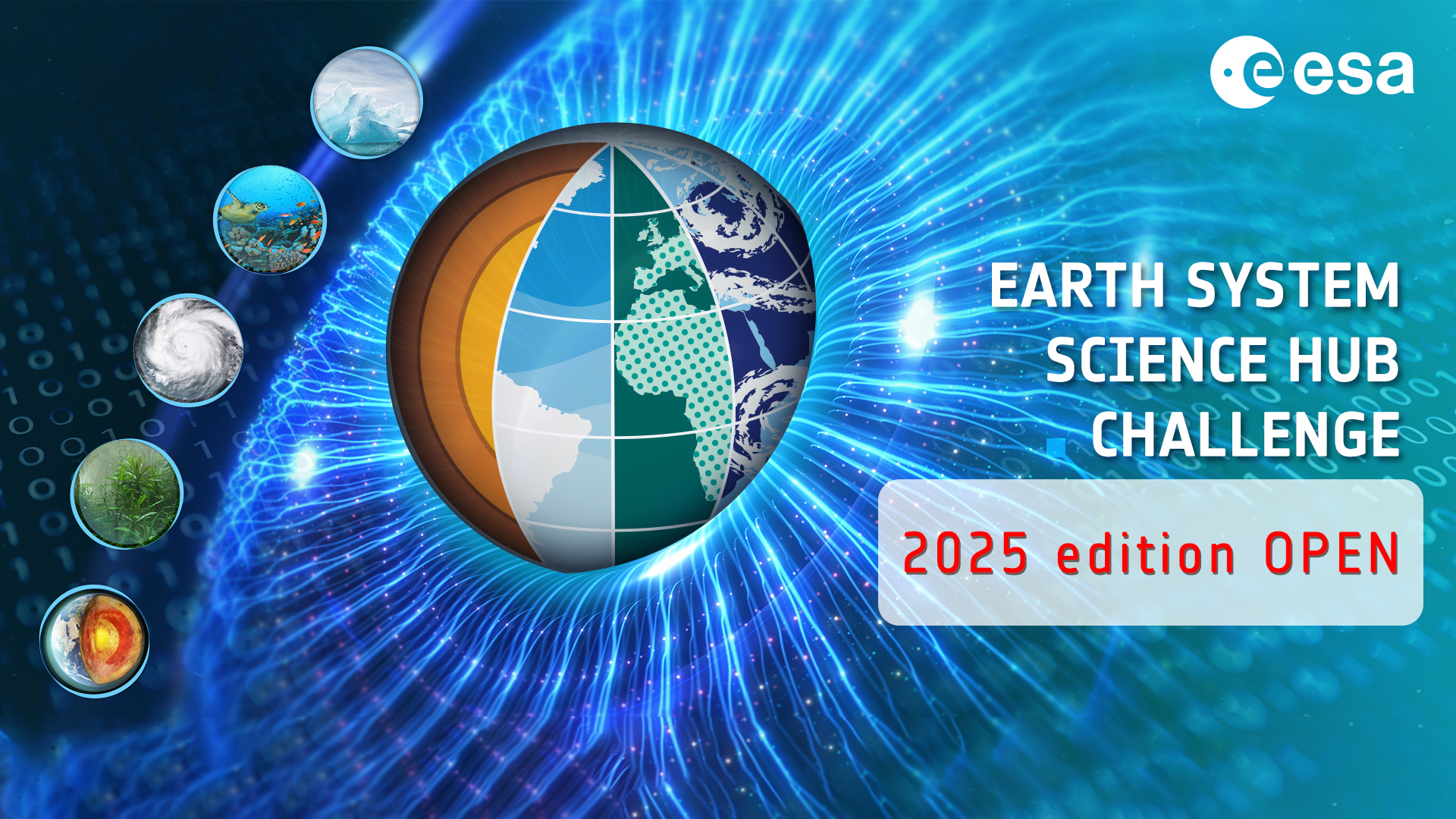
Science Challenges 2025: Call for Participation
- Post by: Science Hub Team
- October 30, 2024
The European Space Agency is pleased to announce a unique opportunity for universities offering Master’s or PhD programmes in Earth Observation (EO), Environmental Science, Remote Sensing, or related disciplines, to participate in the Science Challenges 2025 held at ESA’s ESRIN facility, the heart of ESA’s Earth Observation activities.
| FORMAT | 1-week hands-on workshop |
| LOCATION | ESRIN, Frascati, Italy |
| DATES | 2025 (exact dates to be agreed with selected Universities) |
| APPLICATION DEADLINE | extended to 25 November 2024 |
Previous Science Challenges editions:
Why participate?
Participating students will have the opportunity to:
-
- Spend one week at an ESA site (ESRIN) and experience the dynamic world of Earth Observation research and innovation.
-
- Participate in hands-on training with ESA and TPM (third-party missions) EO data, on cloud platforms such as DeepESDL, openEO Platform or MAAP. Scientific and technical support will be provided by experts in their fields throughout the training.
-
- Showcase their work on a global platform: The best student projects will have the chance to be featured on the prestigious ESA-NASA-JAXA Earth Observation Dashboard. This tri-agency platform reaches an international audience, offering students a unique opportunity to highlight their research on a global stage, in collaboration with three of the world’s leading space agencies.
-
- Engage with EO Mission Managers and experts from the ESA Science Hub, learning from leading scientists in the field.
-
- Receive up to 1 year of sponsored access to cloud computing resources (e.g., DeepESDL) through the ESA NoR sponsorship.
-
- Explore the Phi Experience and ESA’s Phi-lab, witnessing cutting-edge Earth Observation innovation.
Structure of the event
The workshop is designed to provide a balanced mix of expert-led sessions and practical project work:
-
- 40% Lectures, meetings, and visits: Students will participate in lectures delivered by EO experts and mission managers, as well as engage in site visits to key ESA facilities such as the Phi-lab and the Phi Experience.
-
- 60% Hands-on project work: Students will work in teams of 2-3 students on a research project using multivariate EO datasets provided by ESA. Each team will complete a research assignment over the course of two days, supported by expert guidance.
-
- The projects will be Python-based and students will have access to cloud computing platforms such as DeepESDL or openEO Platform to analyze and process large-scale EO datasets. Teams will use cutting-edge technologies and datasets to address relevant Earth science challenges. Access to the platforms will be sponsored by ESA.
Eligibility and Application Requirements
Universities are invited to propose a group of students (up to 15 students) to attend the workshop, with the following guidelines:
-
- Proposed research themes: Universities applying to this call are invited to propose scientific topics to be addressed during the workshop with relevance to their programme of studies. Applicants should provide a clear and concise description of up to 3 initial research topics that can be addressed with ESA data. The final themes for the workshop will be defined in collaboration with ESA and the workshop science team, ensuring they meet the objectives of the event and leverage available resources.
-
- Diversity of participation: To foster collaboration across institutions, we encourage proposals that involve combined smaller groups of students from different universities. The total number of participants will be capped at 15 students, and proposals with fewer students will allow for collaboration with students from other institutions.
-
- Cost sharing: Universities are expected to cover the travel and subsistence costs for their students during the workshop. ESA will provide on-site training, facilities, and expert guidance at no additional cost.
-
- Student diversity: Proposals that reflect a diverse student body (in terms of gender, discipline, and institutional background) will be considered favourably.
How to Apply
To apply, universities should submit a proposal document including:
- Proposed research themes: A clear description of the themes the students will work on using EO data during the workshop. Include a rationale for how this research will contribute to the broader EO community and the relevance of ESA data.
- Student details: Provide the number of students proposed (between 6 and 15) and their profiles (e.g., study discipline, level of study). Note the importance of diversity in terms of gender, discipline, and institutions.
- University collaboration: Indicate whether the proposal includes students from multiple universities. Proposals that include students from different universities are encouraged.
- Logistics: A confirmation that the university will cover students’ transport and subsistence costs for the week at ESRIN.
Proposal Submission
Please submit your proposal as a single PDF file to ScienceHub@esa.int by 25 November 2024. Submissions should not exceed 4 pages.
Selection Criteria
Proposals will be evaluated based on the following:
1. Relevance and innovation of proposed research themes (40%)
-
- Does the proposal address current EO challenges?
-
- Is it innovative in its approach to leveraging ESA data and cloud technologies?
2. Collaborative potential (25%)
-
- Does the proposal include a diverse group of students (discipline, institutions, student profiles)?
-
- Is there collaboration between universities?
3. Student capacity and engagement (25%)
-
- Are the students well-prepared to work in a Python-based environment?
-
- Do they have the necessary skills to complete a project in teams of 2-3 within two days?
4. Logistical feasibility (10%)
-
- Can the university provide clear logistical support, including funding for student travel and accommodation? Note that ESA does not require proof of travel funding from the university and the students can finance their own travel and accommodation.
Note that ESA will organise a maximum of 2 Science Challenges in 2025.
Further Information
For any questions about the workshop or the application process, please contact us by email at ScienceHub@esa.int.

